Accelerating Used Water Management in Small Cities: The Way Forward
Projects worth Rs. 11,785 Cr for setting up Sewage Treatment Plants with a capacity of 4900 MLD approved for small cities under Swachh Bharat Mission Urban-2.0
The urban waterscape is constantly transforming and the cities are aiming to conserve and reuse water. Climate change is likely to exacerbate the pressure on water resources. Wastewater is now being considered an integral part of water resources. The new focus under Swachh Bharat Mission-Urban is on the used water emanating from the cities. The effort is to ensure that used water is collected, treated, recycled and reused for various purposes in urban areas.
The urban sanitation is all about sustainability and it is imperative that the cities take care of the environment by not polluting the water bodies by discharging sewage and used water into them. The Water Plus certification provides a guideline for cities to ensure all wastewater released from households, commercial establishments etc. is treated to a satisfactory level before releasing it in the environment. The cities are now ensuring availability and sustainable management of water and sanitation for all, which is aligned with the Sustainable Development Goals. The Urban Local Bodies are empowered to formulate and adopt long-term, city-level wastewater reuse plans, with roles and responsibilities clearly defined. They are also leveraging technological advancements to uphold the efficiency and effectiveness of wastewater treatment.
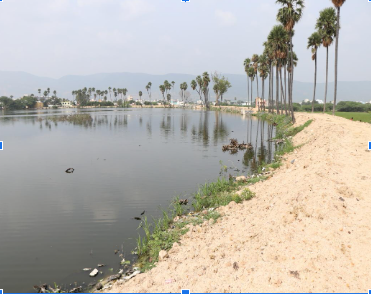
Constant efforts towards improving urban water resources are paving way for Water Plus cities. They are not only collecting, transporting and treating the used water, but are also achieving the highest standards of sustainable sanitation and Used Water Management (UWM). On their way to becoming the ‘Sustainable Cities of Tomorrow’, they are also committed to realizing the goal of circular economy. Today UWM has moved beyond just collection and treatment of used water. Via the ODF++ protocol the cities are being assessed to ensure that entire sewage including faecal sludge & septage is safely managed and treated and the Water+ protocol is certifying cities on not just collection, transportation and treatment, but also reuse of both used water and faecal sludge to prevent environmental pollution.
In this day and age, the pace of infrastructure creation is at its peak with multiple stakeholders coming together to build homes and cities based on maximum reuse of used water. Today a robust process is in place to expedite such projects. Projects worth Rs. 11,785 Cr for setting up Sewage Treatment Plants with a capacity of 4900 MLD has been approved for small cities under SBM 2.0.
Indore, Surat, New Delhi Municipal Council (NDMC), Tirupati, Chandigarh, Navi Mumbai, Vijayawada, Hyderabad, Greater Visakhapatnam, Karad, Panchgani, Bhopal, Baramati and Mysore are all Water+ certified cities. These cities have been trailblazers for a reason. They have not only been able to collect and safely treat used water but have also been able to re-use water after secondary/ tertiary treatment. These cities have been innovative in their own ways to find means to treat water and reuse it for everything from agriculture to horticulture, from washing roads to rejuvenation of lakes. India is quickly emerging as one of the fastest growing markets for reuse of treated wastewater, especially for industrial reuse.
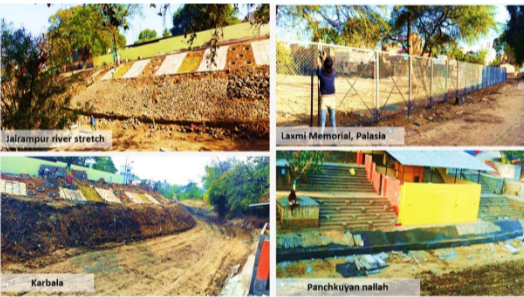
Indore added another feather in its cap after becoming the first city to get a Water Plus Certification. It paved way for sustainable sanitation and used water management processes that were not only exemplary but also motivated many small cities to follow their lead. At present, there is no untreated wastewater flowing through the rivers and the natural and man-made storm water drains in Indore. By 2020, Indore had 7 decentralised STPs besides the existing 3 centralised STPs and had laid over 200 kms of piped network for carrying treated wastewater. The largest city of Madhya Pradesh initiated efforts for water conservation (groundwater and surface water) and installed more than 1.25 lakh rainwater harvesting units in various residential and non-residential areas across the city within a span of 4 months in 2022. The treated wastewater is now being used for water gardens and roadside plantations and horticulture, washing roads and sewer cleaning machines etc.
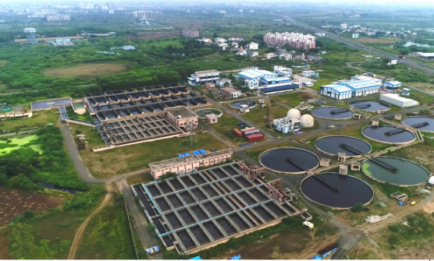
Surat Municipal Corporation (SMC) has converted the wastewater generated in the city into the resource by establishing 4 Tertiary Treatment Plants with installed capacity of 116 MLD thereby reducing dependency on fresh water resources & creating treated wastewater as an economic resource, to promote Sustainability and circular economy, Surat has started reuse of treated waste water in various non potable purposes like Industrial use, rejuvenation of lakes, Agriculture – mass plantation, sewer cleaning, Gardening, etc. through direct service line as well as Tanker Filling Station. As of today, Surat has 170 sewer cleaning machineries, which also include machineries based on Latest Advanced Robotic Technology for cleaning of Sewerage System.
Tirupati has amassed several laurels over the years. Declared as Water Plus, it is also a frontrunner when it comes to developing a self-sustaining model for an STP.
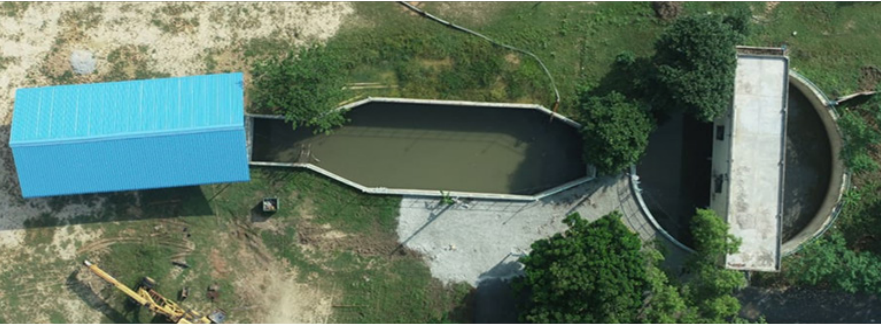
The STP located at Thukivakam was built at a cost of Rs. 19 Crores, and has an installed capacity of 50 MLD serving 10,4057 households. A volume of 24 MLD of treated STP water is reused. By selling 5 MLD of treated used water to Srikalahasthi Pipes Ltd., the plant is able to generate a net revenue of Rs. 6 Lakhs per month. Additionally 18 MLD of treated used water is supplied to farmers for agriculture purpose free of cost and another portion is reused by the ULB for road/street cleaning, watering road medians and parks and gardens in the city. The unique measures adopted for ensuring sustainable O&M of the STP is worth emulation by other ULBs.
Navi Mumbai is the only city in Maharashtra to achieve 5 star and 1st City of the State to achieve Water+ Certification. They upgraded the sewage treatment technology and the
STPs are designed to cater the needs of sewage treatment for population of 30 Lakh. They upgraded the pumping stations for reduction in energy cost and to transfer the sewage generated to STPs. Navi Mumbai undertook preventive maintenance of sewer network to avoid the hotspots in the network. Navi Mumbai has 100% mechanized sewer line & septic tank cleaning. NMMC has a centralized monitoring of all septic tanks in the city through Level Transmitters. More than 30 % of treated water is being reused in more than 30 city gardens, washing of all solid-waste vehicles, compactors, city transport buses, sprinklers, and road dividers hence reducing the usage of freshwater.
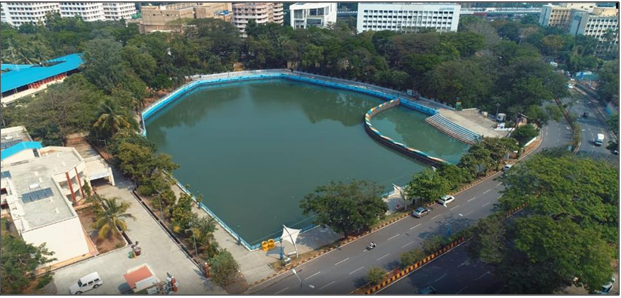
Andhra Pradesh became the first State to have 3 cities with a Water Plus tag – Tirupati, Vijayawada & Visakhapatnam. Vizag has 17 Waste Water Treatment plants with total capacity of 172 MLD. For improvisation of the treatment of sewage to its finest level, the city has taken measures to bring all the households into a unified cluster of Under Ground
Network (UGD). GVMC has introduced robotic machines (Bandicoots) for manhole cleanings to avoid manual cleaning. Biosep (a bioremediation methodology of In-situ treatment of Faecal sludge within the septic tanks to reduce the concentration levels of waste to a level where it does not impact the environment) has been used in few septic tanks within residential areas in the city to demonstrate the treatment efficiency. Visakhapatnam is supplying approximately 20 MLD of treated waste water to HPCL industry, 2 MLD for Jindal Waste to Energy plant, 8 MLD for golf club and 15 MLD of treated waste water is being used for horticulture and city beautification activities in its jurisdiction.
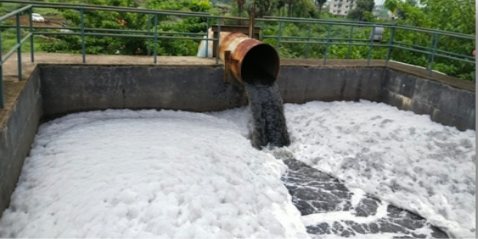
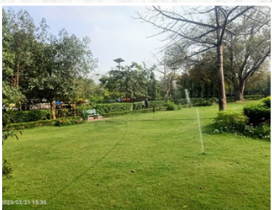
Kidwai Nagar East is a zero waste discharge colony which has been achieved
by
treatment of used water at the STP plants of 3.65 MLD capacity, rain water harvesting systems and an
in-house solid waste management plant of 3.5 TPD. Used water generated from flats is being treated in
STP plants and there is no discharge to the municipal sewer line.
The treated water from the STP is being used in toilets for flushing (dual pipeline is laid for this
purpose), horticulture, air conditioning, road cleaning etc. Also rainwater is being infiltrated through
the rain water harvesting systems leading to recharge of ground water.
The Swachh Bharat Mission Urban 2.0 aims to set up sewage facilities in all cities by 2026 with at least 50% of the Cities being Water +.
WEBSITE: https://sbmurban.org/
FACEBOOK: Swachh Bharat Mission - Urban | TWITTER: @SwachhBharatGov
INSTAGRAM:sbm_urban | YOUTUBE: Swachh Bharat Urban | LINKEDIN: swachh-bharat-urban